
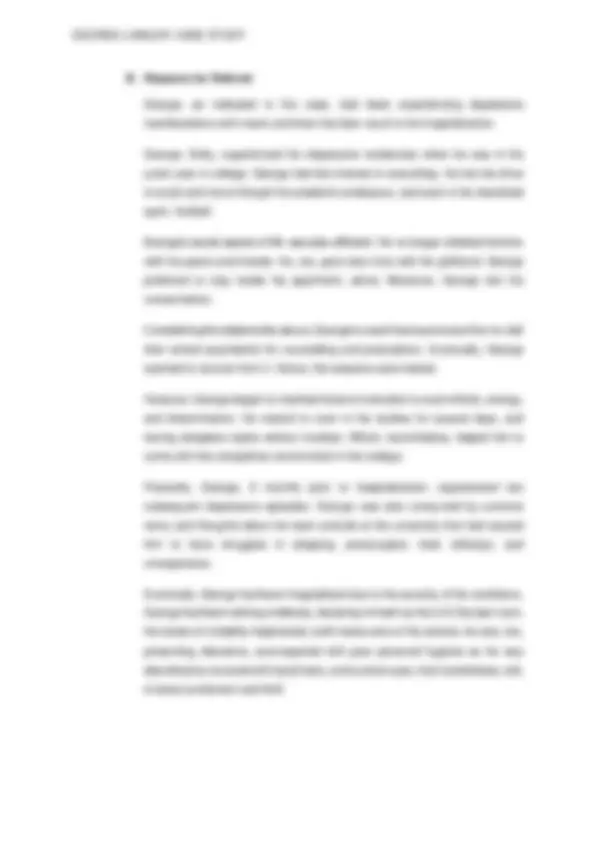
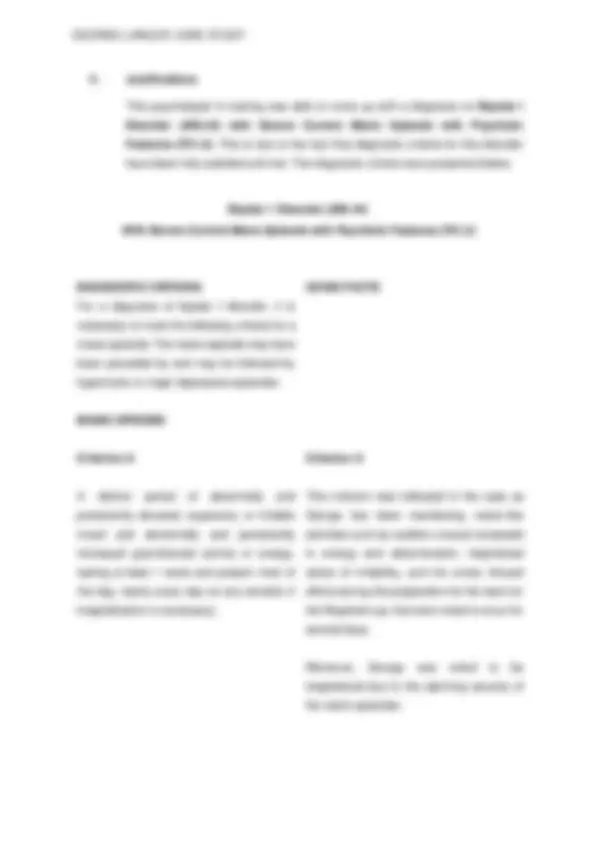
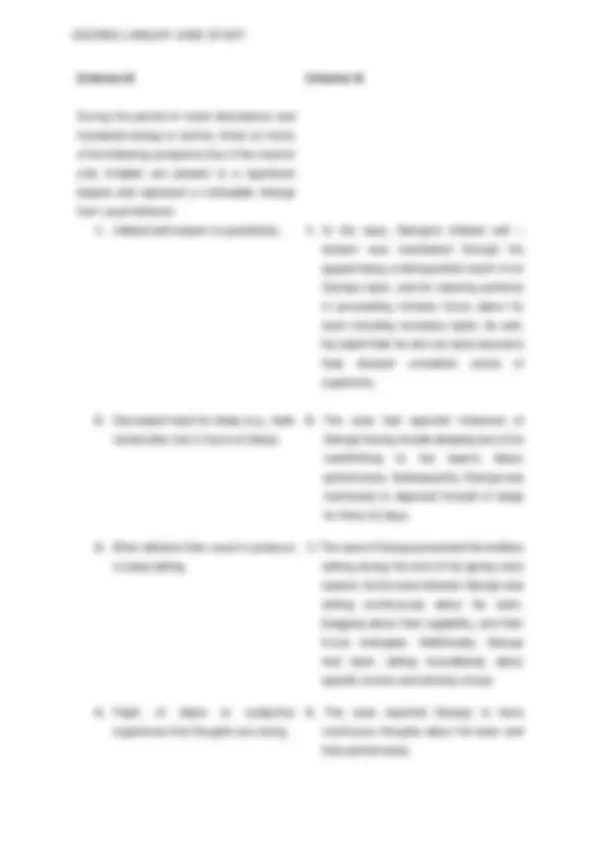
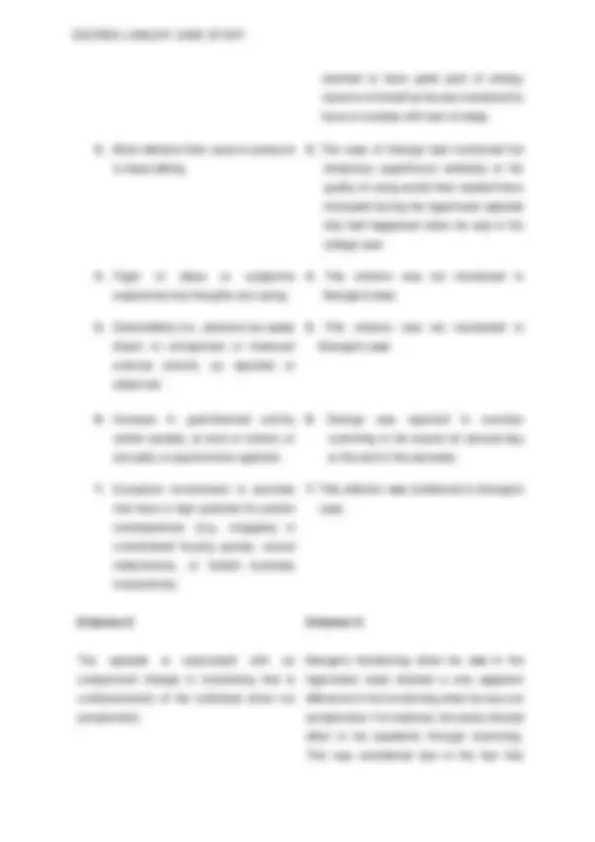
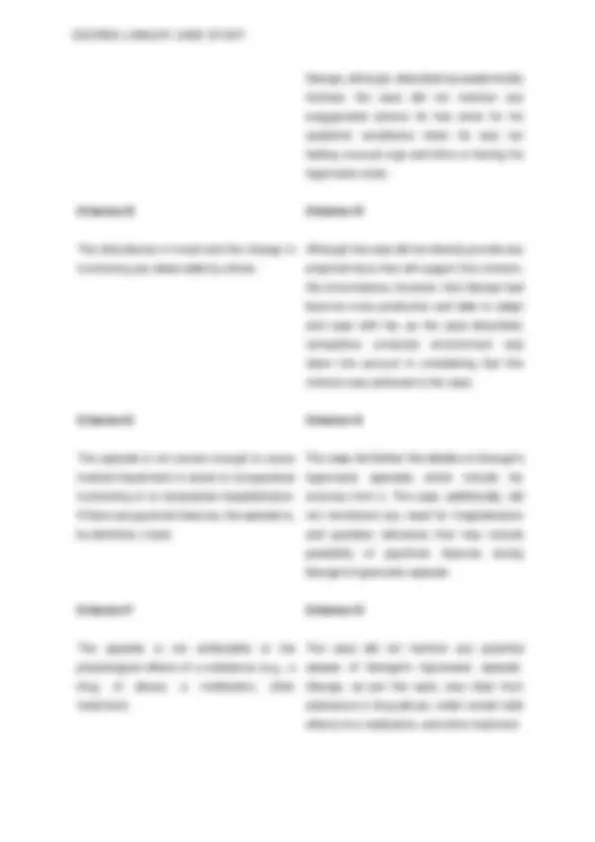
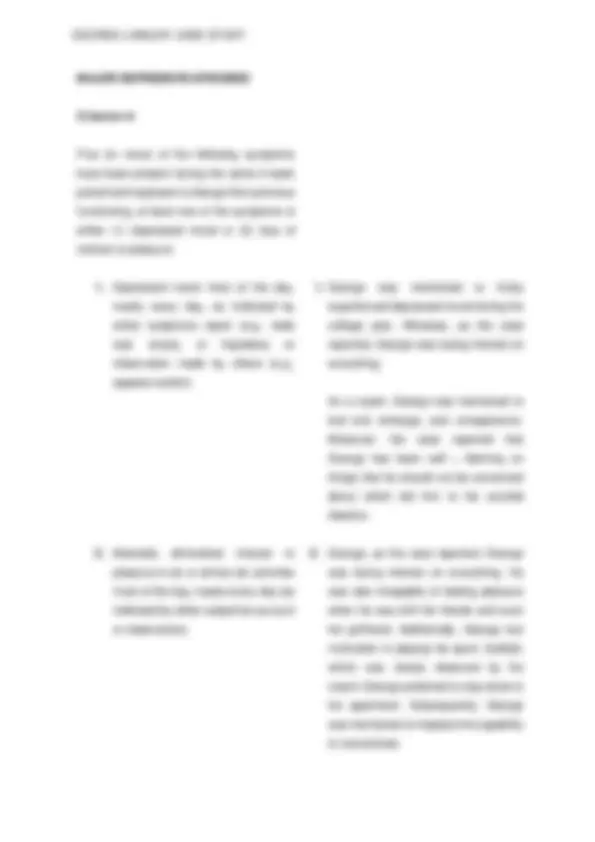
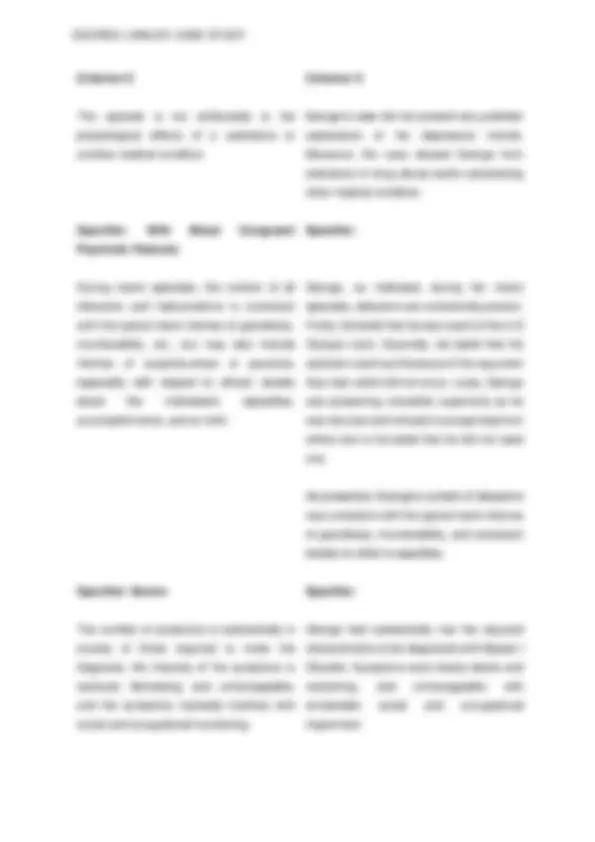
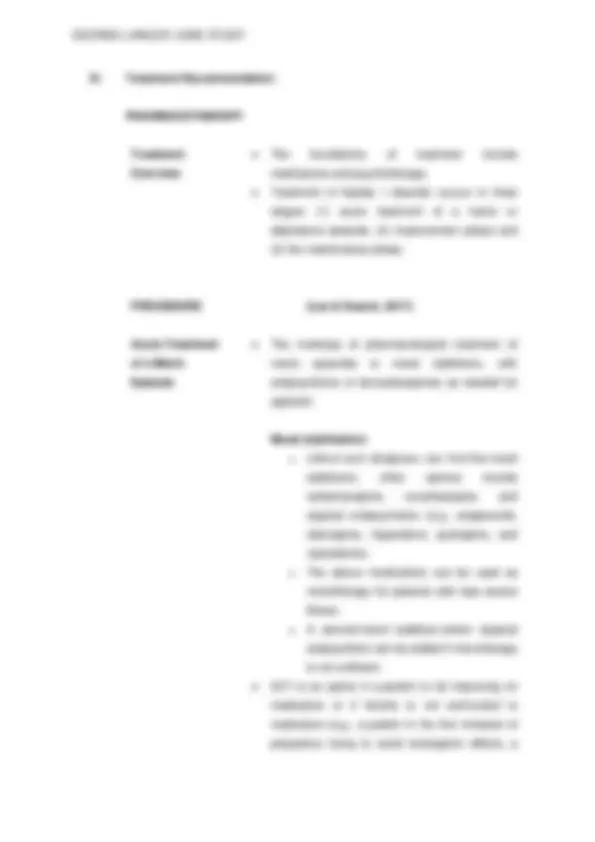
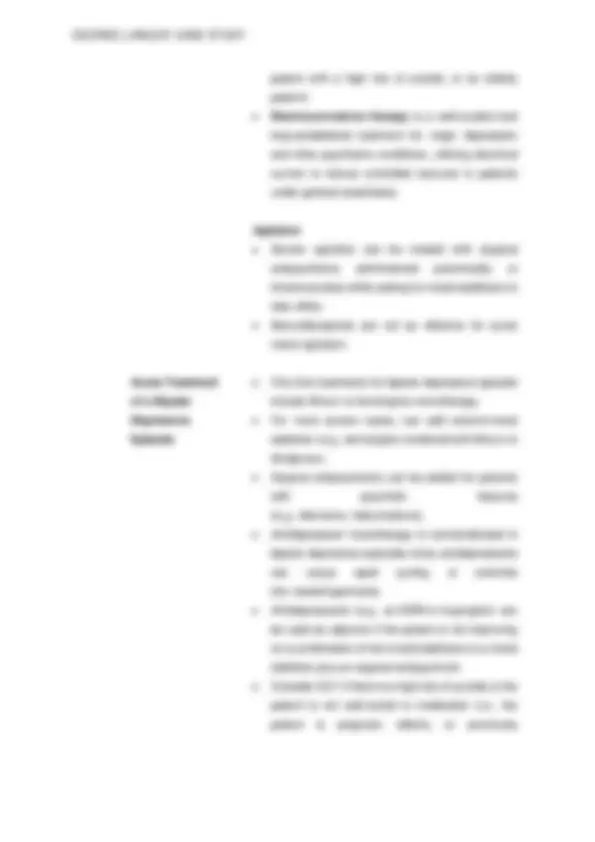
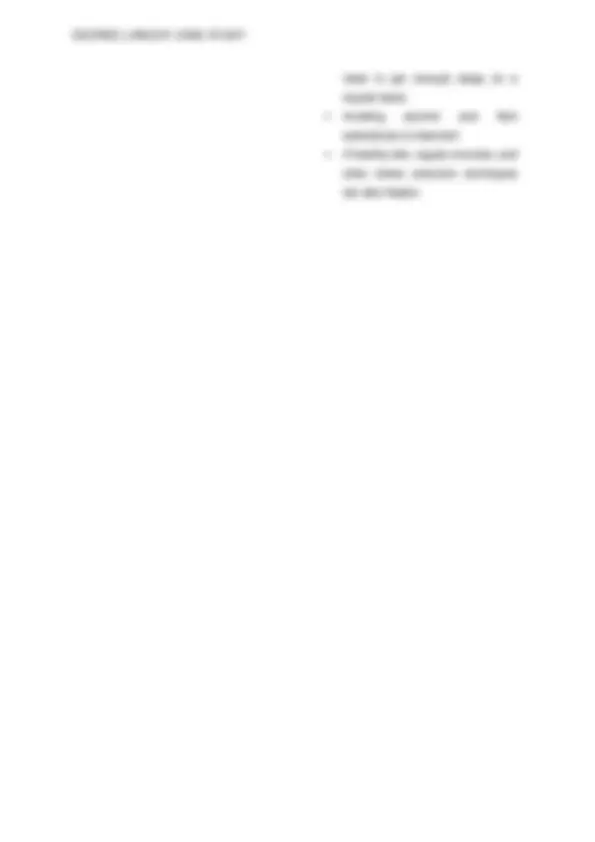
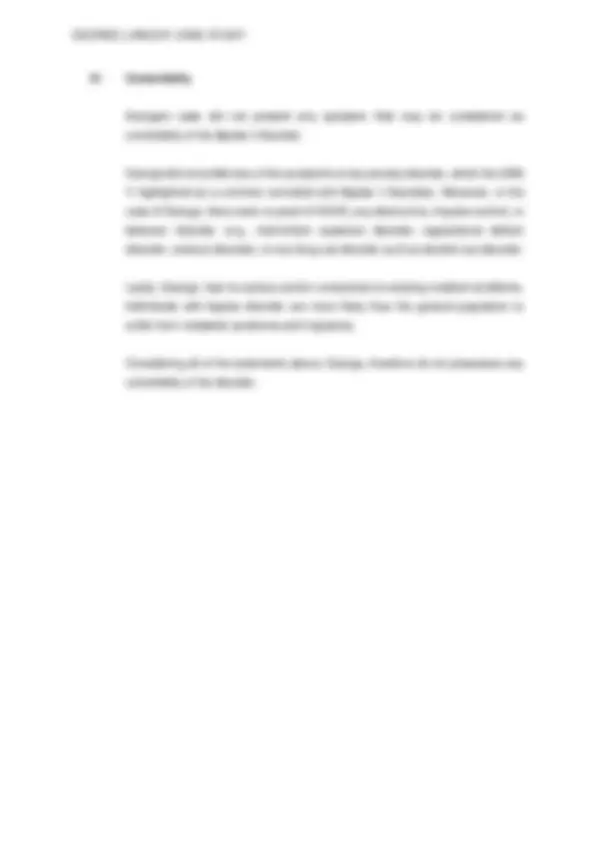
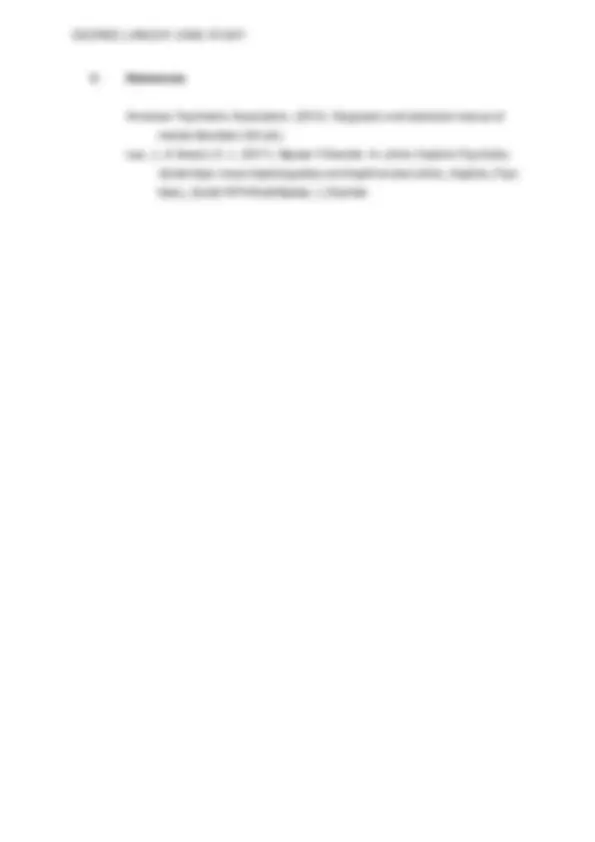


Study with the several resources on Docsity

Earn points by helping other students or get them with a premium plan


Prepare for your exams
Study with the several resources on Docsity

Earn points to download
Earn points by helping other students or get them with a premium plan
Community
Ask the community for help and clear up your study doubts
Discover the best universities in your country according to Docsity users
Free resources
Download our free guides on studying techniques, anxiety management strategies, and thesis advice from Docsity tutors
George Lawler, the subject of the case, was a 35-year-old married man, and a father of two young children. George was making a living as a physical education instructor and a coach of the men’s and women’s track teams in a small college.
Typology: Papers
1 / 20

This page cannot be seen from the preview
Don't miss anything!













University of Mindanao Digos College College of Arts and Science Psychology Program Roxas Ave., Digos City PSY 22 2 George Lawler: Bipolar 1 Disorder (296.44) With Severe Current Manic Episode with Psychotic Features (F31.2) STEVEN DAVE T. DURADO April, 2021
George Lawler: Bipolar 1 Disorder (296.44) With Severe Current Manic Episode with Psychotic Features (F31.2) Diagnostic Profile I. Introduction A. Client’s Profile George Lawler, the subject of the case, was a 35 - year-old married man, and a father of two young children. George was making a living as a physical education instructor and a coach of the men’s and women’s track teams in a small college. George as a student demonstrated an exemplary persistence and performance in his academic journey. He has been distinguished as one of the notable students in their campus. Considering that George was not just an academic highflier but, as well, he was an auspicious athlete. George as a coach had been presenting excellent leadership skill. George managed to put his teams into their victories. Undefeated for several seasons, and declared as a champion team in conferences. George had really been exerting efforts in honing and making his team the best among best. George, too, was evidently passionate on his work. He devoted himself on working on his team and his reputation on his field. George’s desire of becoming one of the greatest coaches in athletic association has been apparent and that his efforts were all leading into the desires. George as a husband and a father to his two young children, however, have never been fully disclosed in the case. Information about his fatherhood and being a spouse were limited.
II. Justifications This psychologist in training was able to come up with a diagnosis on Bipolar I Disorder (296.44) with Severe Current Manic Episode with Psychotic Features (F31.2). This is due to the fact that diagnostic criteria for this disorder have been fully satisfied and met. The diagnostic criteria were presented below. Bipolar 1 Disorder (296.44) With Severe Current Manic Episode with Psychotic Features (F31.2) DIAGNOSTIC CRITERIA GIVEN FACTS For a diagnosis of bipolar I disorder, it is necessary to meet the following criteria for a manic episode. The manic episode may have been preceded by and may be followed by hypomanic or major depressive episodes: MANIC EPISODE Criterion A A distinct period of abnormally and persistently elevated, expansive, or irritable mood and abnormally and persistently increased goal-directed activity or energy, lasting at least 1 week and present most of the day, nearly every day (or any duration if hospitalization is necessary). Criterion A This criterion was indicated in the case as George has been manifesting manic-like activities such as sudden unusual increased in energy and determination, heightened sense of irritability, and his overly infused efforts during the preparation for his team for the Regional cup, that were noted to occur for several days. Moreover, George was noted to be hospitalized due to the alarming severity of his manic episodes.
Criterion B During the period of mood disturbance and increased energy or activity, three (or more) of the following symptoms (four if the mood is only irritable) are present to a significant degree and represent a noticeable change from usual behavior: Criterion B
1. Inflated self-esteem or grandiosity. 1. In the case, George’s inflated self – esteem was manifested through his appeal being a distinguished coach of an Olympic team, and for claiming authority in proceeding intricate future plans for team including monetary rights. As well, his belief that he did not need anyone’s help showed unrealistic sense of superiority. 2. Decreased need for sleep (e.g., feels rested after only 3 hours of sleep). 2. The case had reported instances of George having trouble sleeping due to his overthinking to his team’s future performance. Subsequently, George was mentioned to deprived himself of sleep for three (3) days. 3. More talkative than usual or pressure to keep talking. 3. The case of George presented his endless talking during the end of the spring track season. As the case showed, George was talking continuously about his team, bragging about their capability, and their future strategies. Additionally, George had been talking boundlessly about specific events and winning virtues. 4. Flight of ideas or subjective experience that thoughts are racing. 4. The case reported George to have continuous thoughts about his team and their performance.
Criterion D The episode is not attributable to the physiological effects of a substance (e.g., a drug of abuse, a medication, other treatment) or to another medical condition. Criterion D George’s case did not present any other potential reasons for his manic episodes such as substance and drug abuse, medication, and other medical condition. HYPOMANIC EPISODE Criterion A A distinct period of abnormally and persistently elevated, expansive, or irritable mood and abnormally and persistently increased activity or energy, lasting at least 4 consecutive days and present most of the day, nearly every day. Criterion A The case reported George’s hypomanic episode during his junior college year. Whereas, Gorge mentioned to have period of unusual drive and motivation that lead him to be capable of cramming on his exams for several days, and having no problem with sleepless nights. Additionally, George seemed to be able to summoned endless energy that eventually helped him to coped with his competitive academic environment. Criterion B During the period of mood disturbance and increased energy and activity, three (or more) of the following symptoms (four if the mood is only irritable) have persisted, represent a noticeable change from usual behavior, and have been present to a significant degree: Criterion B
1. Inflated self-esteem or grandiosity. 1. This was not mentioned in the case of George. 2. Decreased need for sleep (e.g., feels rested after only 3 hours of sleep). 2. The case had reported that George did not need any external stimulus that helped him to stay awake at nights. George
seemed to have great pool of energy reserve in himself as he was mentioned to have to troubles with lack of sleep.
3. More talkative than usual or pressure to keep talking. 3. The case of George had mentioned his temporary superfluous verbosity or his quality of using words than needed have increased during his hypomanic episode that had happened when he was in his college year. 4. Flight of ideas or subjective experience that thoughts are racing. 4. This criterion was not mentioned in George’s case. 5. Distractibility (i.e., attention too easily drawn to unimportant or irrelevant external stimuli), as reported or observed. 5. This criterion was not mentioned in George’s case. 6. Increase in goal-directed activity (either socially, at work or school, or sexually) or psychomotor agitation. 6. George was reported to exercise cramming in his exams for several day at the end of the semester. 7. Excessive involvement in activities that have a high potential for painful consequences (e.g., engaging in unrestrained buying sprees, sexual indiscretions, or foolish business investments). 7. This criterion was mentioned in George’s case. Criterion C The episode is associated with an unequivocal change in functioning that is uncharacteristic of the individual when not symptomatic. Criterion C George’s functioning when he was in his hypomanic state showed a very apparent difference in his functioning when he was not symptomatic. For instance, his overly infused effort in his academic through cramming. This was considered due to the fact that
Criterion A Five (or more) of the following symptoms have been present during the same 2-week period and represent a change from previous functioning; at least one of the symptoms is either (1) depressed mood or (2) loss of interest or pleasure.
1. Depressed mood most of the day, nearly every day, as indicated by either subjective report (e.g., feels sad, empty, or hopeless) or observation made by others (e.g., appears tearful). 1. George was mentioned to firstly experienced depressed mood during his college year. Whereas, as the case reported, George was losing interest on everything. As a coach, George was mentioned to feel dull, lethargic, and unresponsive. Moreover, the case reported that George has been self – blaming on things that he should not be concerned about which led him to his suicidal ideation. 2. Markedly diminished interest or pleasure in all, or almost all, activities most of the day, nearly every day (as indicated by either subjective account or observation). 2. George, as the case reported, George was losing interest on everything. He was also incapable of feeling pleasure when he was with his friends and even his girlfriend. Additionally, George lost motivation in playing his sport, football, which was clearly observed by his coach. George preferred to stay alone in his apartment. Subsequently, George was mentioned to misplace his capability to concentrate.
3. Significant weight loss when not dieting or weight gain (e.g., a change of more than 5% of body weight in a month), or decrease or increase in appetite nearly every day. 3. This criterion was not mentioned in George’s case. 4. Insomnia or hypersomnia nearly every day. 4. George, due to overthinking of his team and its future performance in the meet, had been suffering from inability of sleep and rest. The case, as well, reported that George had been waking up in the middle of the night purposelessly and that George was always feeling tired. 5. Psychomotor agitation or retardation nearly every day (observable by others; not merely subjective feelings of restlessness or being slowed down). 5. George was reported to lethargic and unresponsive. As well, as the mentioned that George was speaking so slowly and in a dull monotone. George refused to get out of his bed. And instead, alternately having long period of sleep and vacuously staring at the ceiling. George was described to always feeling tired and restless. 6. Fatigue or loss of energy nearly every day. 6. The case described George as lethargic and always feeling tired. George preferred to stay on his bed, take long sleeps, and do nothing. With this, George was mentioned to quit his job. 7. Feelings of worthlessness or excessive or inappropriate guilt (which may be delusional) nearly every day (not merely self-reproach or guilt about being sick). 7. The case mentioned that George has been blaming himself for everything. For the denied travel fund for their department and for early vacation of his assistance coach. George, as well, was reported to profusely apologizing to his
Criterion C The episode is not attributable to the physiological effects of a substance or another medical condition. Criterion C George’s case did not present any potential explanation of his depressive moods. Moreover, the case cleared George from substance or drug abuse and/or possessing other medical condition. Specifier: With Mood Congruent Psychotic Features During manic episodes, the content of all delusions and hallucinations is consistent with the typical manic themes of grandiosity, invulnerability, etc., but may also include themes of suspiciousness or paranoia, especially with respect to others’ doubts about the individual’s capacities, accomplishments, and so forth. Specifier: George, as indicated, during his manic episodes, delusions are consistently present. Firstly, his belief that he was coach of the U.S Olympic track. Secondly, his belief that his assistant coach quit because of the argument they had, which did not occur. Lasty, George was presenting unrealistic superiority as he was reluctant and refused to accept help from others due to his belief that he did not need one. As presented, George’s content of delusions was consistent with the typical manic themes of grandiosity, invulnerability, and consistent doubts on other’s capacities. Specifier: Severe The number of symptoms is substantially in excess of those required to make the diagnosis, the intensity of the symptoms is seriously distressing and unmanageable, and the symptoms markedly interfere with social and occupational functioning. Specifier: George had substantially met the required characteristics to be diagnosed with Bipolar I Disorder. Symptoms were clearly drastic and worsening, and unmanageable with remarkable social and occupational impairment.
III. Treatment Recommendation PHARMACOTHERAPY Treatment Overview
experienced rapid cycling or a switch into mania/hypomania/mixed state on antidepressants). Improvement Phase
Acute Treatment of Manic Episode or Depressive Episode The focus of psychotherapy during an acute manic or depressive episode is support and education. o Education for the patient and family should emphasize that the patient’s mood symptoms are due to a treatable illness, that the patient must continue taking his/her medication and coming to appointments, and that suicide is not acceptable. Improvement Phase of Treatment During the improvement phase, psychotherapy focuses on identifying and addressing stressors that can trigger mood symptoms, and dealing with damage to relationships, work, or finances that occurred during mood episodes. Maintenance Phase of Treatment
IV. Comorbidity George’s case did not present any symptom that may be considered as comorbidity of his Bipolar I Disorder. George did not exhibit any of the symptoms of any anxiety disorder, which the DSM V highlighted as a common comorbid with Bipolar I Disorders. Moreover, in the case of George, there were no proof of ADHD, any destructive, impulse-control, or behavior disorder (e.g., intermittent explosive disorder, oppositional defiant disorder, conduct disorder), or any drug use disorder such as alcohol use disorder. Lastly, George, had no serious and/or unresolved co-existing medical conditions. Individuals with bipolar disorder are more likely than the general population to suffer from metabolic syndrome and migraines. Considering all of the statements above, George, therefore do not possesses any comorbidity of his disorder.
V. References American Psychiatric Association. (2013). Diagnostic and statistical manual of mental disorders (5th ed.). Lee, J., & Swartz, K. L. (2017). Bipolar I Disorder. In Johns Hopkins Psychiatry Guide https://www.hopkinsguides.com/hopkins/view/Johns_Hopkins_Psyc hiatry_Guide/787045/all/Bipolar_I_Disorder